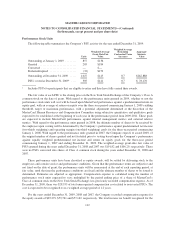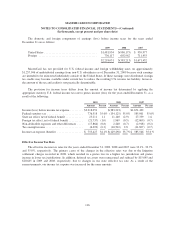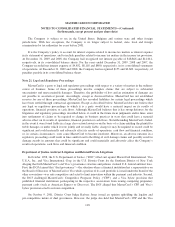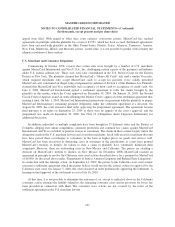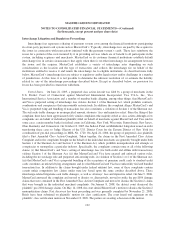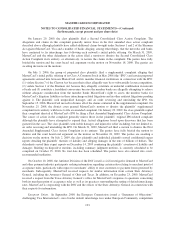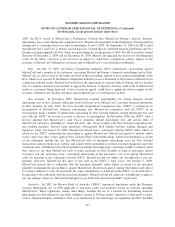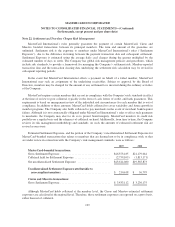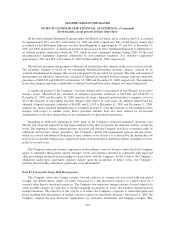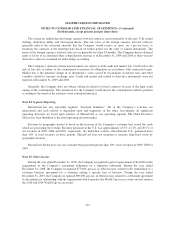MasterCard 2009 Annual Report Download - page 132
Download and view the complete annual report
Please find page 132 of the 2009 MasterCard annual report below. You can navigate through the pages in the report by either clicking on the pages listed below, or by using the keyword search tool below to find specific information within the annual report.MASTERCARD INCORPORATED
NOTES TO CONSOLIDATED FINANCIAL STATEMENTS—(Continued)
(In thousands, except percent and per share data)
Interchange Litigation and Regulatory Proceedings
Interchange fees represent a sharing of payment system costs among the financial institutions participating
in a four-party payment card system such as MasterCard’s. Typically, interchange fees are paid by the acquirer to
the issuer in connection with transactions initiated with the payment system’s cards. These fees reimburse the
issuer for a portion of the costs incurred by it in providing services which are of benefit to all participants in the
system, including acquirers and merchants. MasterCard or its customer financial institutions establish default
interchange fees in certain circumstances that apply when there is no other interchange fee arrangement between
the issuer and the acquirer. MasterCard establishes a variety of interchange rates depending on such
considerations as the location and the type of transaction, and collects the interchange fee on behalf of the
institutions entitled to receive it and remits the interchange fee to eligible institutions. As described more fully
below, MasterCard’s interchange fees are subject to regulatory and/or legal review and/or challenges in a number
of jurisdictions. At this time, it is not possible to determine the ultimate resolution of, or estimate the liability
related to, any of the interchange proceedings described below. Except as described below, no provision for
losses has been provided in connection with them.
United States. On June 22, 2005, a purported class action lawsuit was filed by a group of merchants in the
U.S. District Court of Connecticut against MasterCard International Incorporated, Visa U.S.A., Inc., Visa
International Service Association and a number of member banks alleging, among other things, that MasterCard’s
and Visa’s purported setting of interchange fees violates Section 1 of the Sherman Act, which prohibits contracts,
combinations and conspiracies that unreasonably restrain trade. In addition, the complaint alleges MasterCard’s and
Visa’s purported tying and bundling of transaction fees also constitutes a violation of Section 1 of the Sherman Act.
The suit seeks treble damages in an unspecified amount, attorneys’ fees and injunctive relief. Since the filing of this
complaint, there have been approximately fifty similar complaints (the majority styled as class actions although a few
complaints are on behalf of individual plaintiffs) filed on behalf of merchants against MasterCard and Visa (and in
some cases, certain member banks) in federal courts in California, New York, Wisconsin, Pennsylvania, New Jersey,
Ohio, Kentucky and Connecticut. On October 19, 2005, the Judicial Panel on Multidistrict Litigation issued an order
transferring these cases to Judge Gleeson of the U.S. District Court for the Eastern District of New York for
coordination of pre-trial proceedings in MDL No. 1720. On April 24, 2006, the group of purported class plaintiffs
filed a First Amended Class Action Complaint. Taken together, the claims in the First Amended Class Action
Complaint and in the complaints brought on the behalf of the individual merchants are generally brought under both
Section 1 of the Sherman Act and Section 2 of the Sherman Act, which prohibits monopolization and attempts or
conspiracies to monopolize a particular industry. Specifically, the complaints contain some or all of the following
claims: (i) that MasterCard’s and Visa’s setting of interchange fees (for both credit and offline debit transactions)
violates Section 1 of the Sherman Act; (ii) that MasterCard and Visa have enacted and enforced various rules,
including the no surcharge rule and purported anti-steering rules, in violation of Section 1 or 2 of the Sherman Act;
(iii) that MasterCard’s and Visa’s purported bundling of the acceptance of premium credit cards to standard credit
cards constitutes an unlawful tying arrangement; and (iv) that MasterCard and Visa have unlawfully tied and bundled
transaction fees. In addition to the claims brought under federal antitrust law, some of these complaints contain
certain unfair competition law claims under state law based upon the same conduct described above. These
interchange-related litigations seek treble damages, as well as attorneys’ fees and injunctive relief. On June 9, 2006,
MasterCard answered the complaint and moved to dismiss or, alternatively, moved to strike the pre-2004 damage
claims that were contained in the First Amended Class Action Complaint and moved to dismiss the Section 2 claims
that were brought in the individual merchant complaints. On January 8, 2008, the district court dismissed the
plaintiffs’ pre-2004 damage claims. On May 14, 2008, the court denied MasterCard’s motion to dismiss the Section 2
monopolization claims. Fact discovery has been proceeding and was generally completed by November 21, 2008.
Briefs have been submitted on plaintiffs’ motion for class certification. The court heard oral argument on the
plaintiffs’ class certification motion on November 19, 2009. The parties are awaiting a decision on the motion.
122


